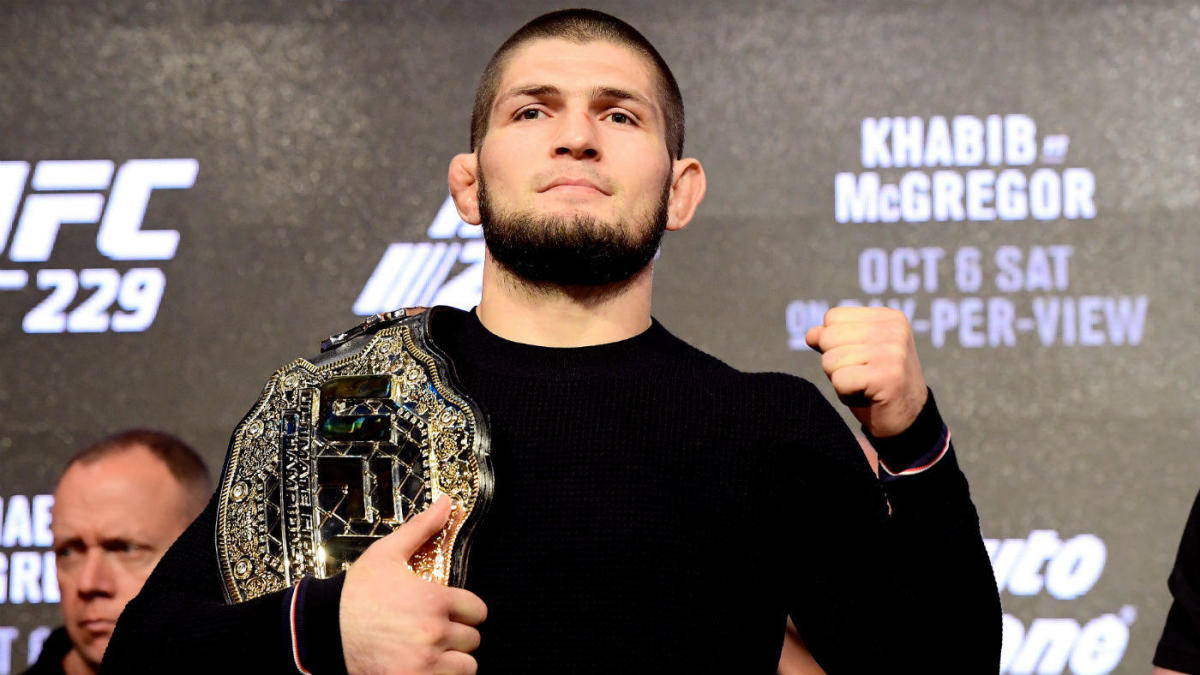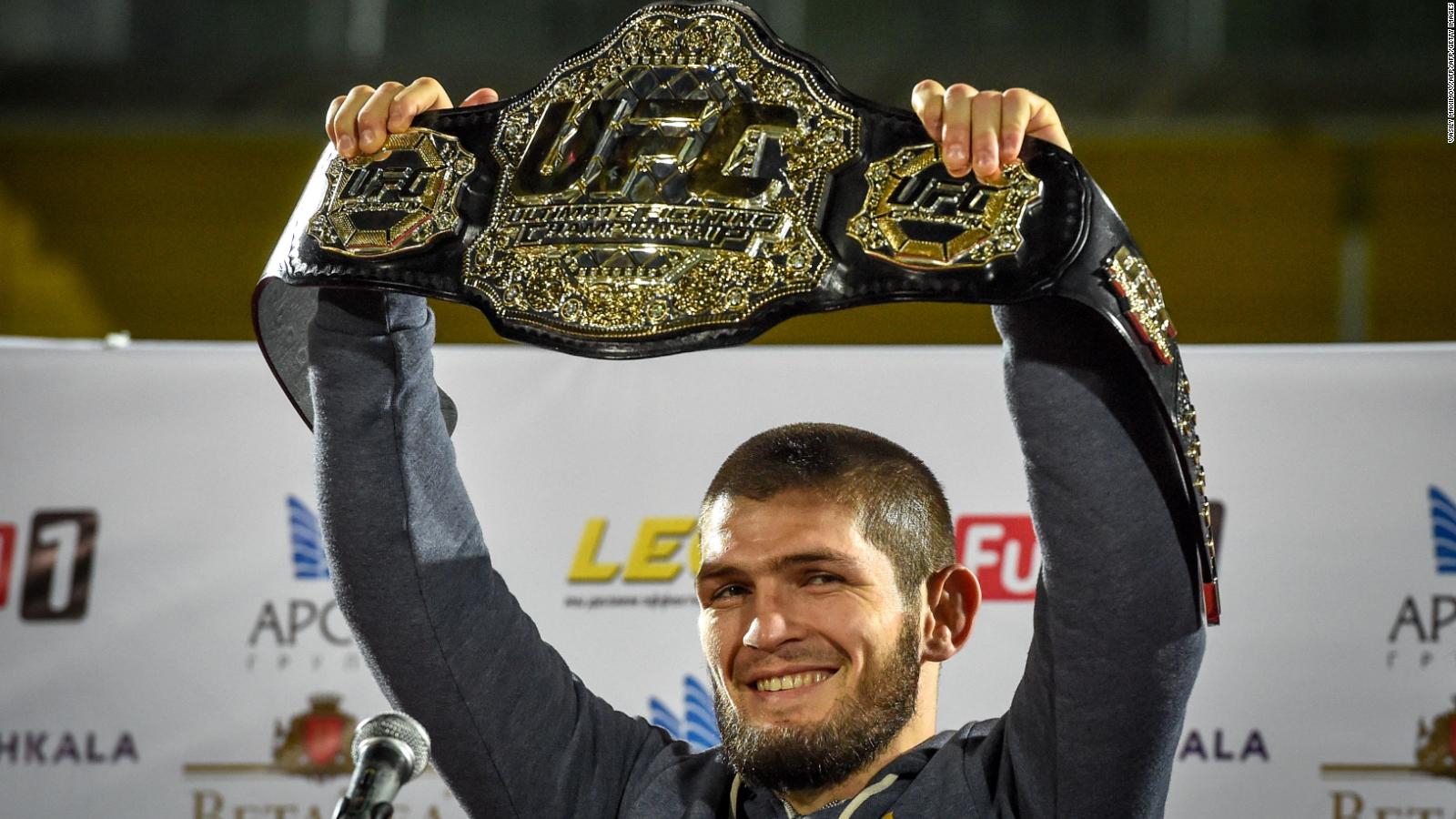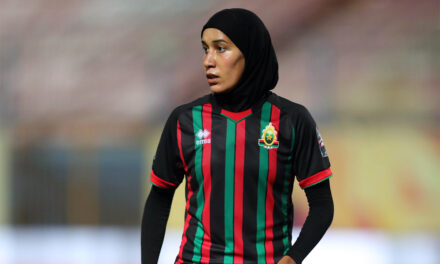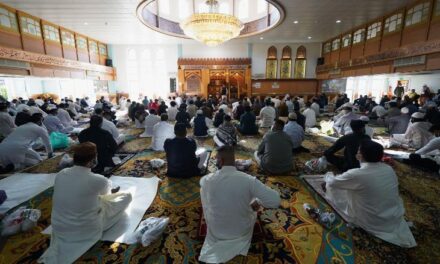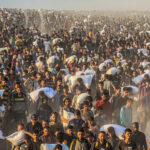Originally Published By:
Tallha Abdulrazaq To TRTWORLD
Photo ©
CBS Sports
Khabib Nurmagomedov is one of the great champions whose glory all Muslims enjoy sharing.
Every generation has its sporting heroes, some of whom transcend the sports they are famous for and use their platform to do good that is far bigger than them.
For a globally persecuted community, reviled and degraded at every turn by politicians and the mainstream media in the West and elsewhere, Muslims have often sought comfort and a sense of sharing in the glory of sporting legends who share their faith – and have managed, despite the odds, to force the public consciousness to acknowledge them and their efforts and to recognize that they are clearly Muslims.
In today’s world, perhaps no other athlete represents the ideals of Islamic piety, humbleness, and being a master of one’s craft more than mixed martial arts legend Khabib “The Eagle” Nurmagomedov.
Tonight, he once again proved that he is the most dominant fighter to grace the cage after defeating top contender Justin Gaethje, bringing his undefeated record to 29-0. Now one step closer to fulfilling his father’s plan of crafting an unparalleled martial artist with a clean 30-0 record*, he is an athlete all Muslims can admire both for his prowess and his behavior in and out of the cage. He is also the kind of champion his late father and trainer Abdulmanap Nurmagomedov would have been proud to say is his son.
Carrying out Abdulmanap’s plan
Khabib, born in the mountainous and rugged climes of the Dagestan region of Russia, has been raised since birth to be a warrior, and not simply just a prizefighter. Throughout his entire career, his father Abdulmanap had been by his side, guiding him to success even when he was denied visas to corner his son’s UFC bouts in the United States.
Abdulmanap’s Islamic faith used to shine through in all his interviews, as his son would ultimately emulate, and he also clearly had faith in the training he gave his son knowing he would reach the top.
Sadly, and as a result of the coronavirus pandemic that has ground the world to a standstill, Abdulmanap fell ill and died at the age of 57 in July. Tonight’s fight was the first time that Khabib had to compete without the comfort a son feels by having his father’s guidance and wisdom to hand.
However, the lightweight champion showed his mettle and demonstrated that he had absorbed his late and great father’s lessons and would continue to honor his memory by achieving at the very highest levels by establishing a sporting legacy inside and outside the cage. His father could not have been prouder.
The keys to Khabib’s success are not a secret. Every fighter who has ever fought against him knew well in advance what he was going to do, yet remained incapable of stopping him from executing Abdulmanap’s tried and tested formula of hard work, discipline, technical excellence, and spiritual conviction.
Khabib’s training regimen is legendarily rigorous, bringing together the sheer toughness the people of the Caucasus are renowned for with the technical excellence his father’s Sambo martial arts imparted upon him, as well as keeping himself mentally and spiritually strong by finding comfort and strength in Islam.
He has been known to wrestle bears as a child, swims against the powerful currents of icy rivers, and to fight against elite training partners until they, and not he, became exhausted and could no longer continue. As Abdulmanap once said about his son, “a child always wants his father to see what his son is capable of” to prove his strength of character.
The Eagle has spent his entire life honoring his father’s mission, showing what he was capable of, and defeating the very best the world had to offer. He not only dominated the Combat Sambo world championships two years in a row in his early twenties but has fought against some of the toughest fighters in the world in MMA competition, becoming the lightweight champion in April 2018 after defeating “Raging” Al Iaquinta, a tough-as-leather New York brawler. He has since defended his title thrice with Gaethje as the latest to fall before him.
Notably, he defended his title once against disgraced superstar Conor McGregor who spent much of 2018 insulting Khabib’s father, wife, and religion only to be smashed by the Dagestani champion, and once in a more respectful but nevertheless decisive bout against Dustin Poirier in 2019.
Abdulmanap’s plan for Khabib was for him to at least reach a pristine 30-0 before retiring. By all accounts, it seems that the Dagestani is just one step away from fulfilling his father’s dream.
Photo ©: CNN International
Unashamedly Muslim in an Islamophobic world
But what makes Khabib so special is not only his professional performance in the cage and his conduct out of it, but also his impact on his fanbase and in his ability to effectively portray practicing Muslims as committed, hardworking, and successful people.
Notably, Khabib often keeps himself out of political affairs. Unlike boxing legend Muhammad Ali, who absolutely dominated the heavyweight division in the 1960s and 1970s, Khabib has chosen a more restrained approach.
An early pillar of the black civil rights movement in America, Ali famously refused to be drafted into the US army to fight the Vietcong in Vietnam, exclaiming in 1967: “They [the Vietcong] never called me nigger”.
Ali was convicted of draft-dodging, refused a boxing license to compete across the United States, was stripped of his heavyweight title, and would not compete again until 1971, stealing four years of a potentially long reign at the top of the sweet science, as boxing is affectionately known.
Nevertheless, “The Greatest” had his unjust conviction overturned and came back to establish himself as one of the all-time most successful and outspoken boxers in history.
Interestingly, Khabib was recently interviewed regarding his own impact in society and if he was the modern-day equivalent of Ali, the People’s Champ. Ever the example of the humble Muslim warrior, the Eagle refused to be compared to Ali, citing the persecution of black Americans at the time Ali was building his legend and said: “To be able to be compared with him, I need to go back to those years and be Black and be a champion. Afterwards, we would see how I would behave in such a situation.”
While Khabib’s political quietism cannot be compared to Ali’s lionhearted defence of his racial and religious background, we now tragically live in an era where Muslims are deemed to be national security threats for daring to be outwardly Muslim, either by women donning hijabs or by men growing beards. They are persecuted across the globe, whether in Indian occupied Kashmir, Myanmar’s Rohingya minority, China’s Uyghur and Hui Muslim populations, or even in the heart of the secular West where French politicians across the political spectrum, including President Emmanuel Macron, are courting Islamophobic votes by making xenophobic statements and pillorying the entire Muslim community due to the actions of an extreme minority.
It is in this way that Khabib’s public speeches broadcast before tens of millions globally of “alhamdulillah”, “inshallah”, and indicating that his success only comes from Allah all while wearing his traditional papakha hat indicating his Avar Muslim heritage send a powerful message.
The bearded Khabib in traditional Dagestani garb, praising his Lord, imbued with a religious conviction that fuels his training, and achieving the highest success in an environment dominated by all the trappings of Western culture, from show-offs like McGregor flashing their wealth, to scantily clad ring girls to ensure a “sex sells” degrading visual feast for a largely male fanbase, sends a powerful message.
Khabib rises above it all, averting his gaze, and dedicating himself to the mastery of his craft as Islamic teachings command.
This model of the Muslim champion, true to his faith, his principles, and with the utmost characteristics of filial piety forces people to respect Muslims for who they are. It also serves as an inspiration for young Muslims around the world who feel under siege because of their identity, yet now can look at Khabib and feel proud of being unabashedly Muslim while aiming to reach the very pinnacle of their field.
For this alone, Khabib’s impact transcends his sport, and I am certain that if he were alive today, Abdulmanap would be praising Allah for the blessing his son has been to his name in life and now in death.
*Editor’s Note: Khabib Nurmagomedov announced retirement soon after the publishing of this article.
